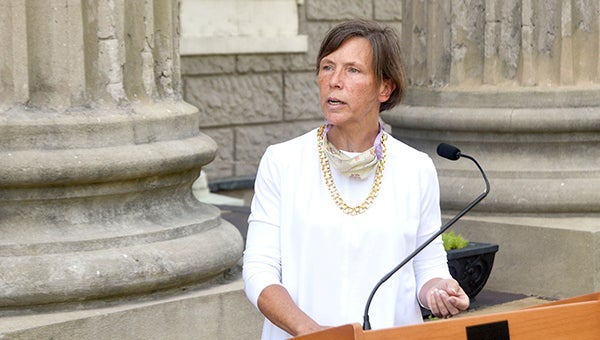Local officials commemorate the centennial anniversary of 19th Amendment
Published 2:56 pm Tuesday, August 18, 2020

- Kelle Barfield
“The right of citizens of the United States to vote shall not be denied or abridged by the United States or by any State on account of sex. Congress shall have power to enforce this article by appropriate legislation.”
Those words, part of the 19th Amendment of the Constitution, ratified Aug. 18, 1920, gave women the right to vote and forever altered the political landscape of the United States. Mississippi was the last state to ratify the amendment, voting to do so in 1984.
On Monday, local officials commemorated the 100th anniversary of the 19th Amendment’s passage with a ceremony at the Old Warren County Court House.
District 5 Supervisor Kelle Barfield said the centennial of the 19th Amendment “is as much about a look forward as it is a look backward — what more we can achieve.”
Barfield said the amendment inspired her to run for office, calling it “the stepping stone without which there was no path.”
And while the right to vote and the comments Susan B. Anthony made that “we the people meaning all people is important,” she was deeply inspired by the persistence of the suffragist movement members to their cause that they spent almost 75 years to achieve what they knew was fundamentally right and wouldn’t give up.
“When something is right it is really worth fighting for. Even if that fight outlasts and outlives you,” Barfield said.
Mayor George Flaggs Jr. said the 19th Amendment enabled women to be elected to office, as well as guaranteeing them the right to vote.
“Today, here in Warren County and Vicksburg, we see any number of women who are elected and in deserved positions because of that day 100 years ago,” Flaggs said. “It is the women’s bloc vote that gets most of us elected because women work together and collaborate together and vote in a large group.”
Women, Flaggs said, have made great strides, not only with the ratification of the 19th Amendment but through their work in elected office.
“Women in this nation and this city and Warren County are valuable and capable of strong leadership and have moved to the forefront actively seeking political office,” he said, pointing out many women who have served in elected office in the county and the city because of the 19th Amendment. “The (women’s suffrage) movement is still strong because we continue to elect women to office.”
Barfield said the women’s suffrage movement was highlighted by three colors — purple, white and gold — which were represented by flowers on a wreath at Monday’s ceremony and symbolized the suffrage rights members’ dedication to the movement.
Purple, she said, represented the members’ dedication, conviction and perseverance to the suffrage movement. The white symbolized quality of the fight for the right to vote.
“Additionally, being ever practical, white dresses were cheaper,” Barfield said. “And as they began to wear white dresses in large numbers, they stood out in contrast to a crowd of men wearing dark suits. This is a vital public persuasion tool to make the power of your numbers as visible as possible.”
Gold, the third color, “symbolized the torch of hope that they (members) passed over the decades of their fight,” Barfield said.
She said that torch is still active “as we continue to work for a world where people are not judged by their gender or race or age but by the quality of their character and their knowledge and skills.”
The women’s suffrage movement began in 1869 when Susan B. Anthony and Elizabeth Cady Stanton formed the National Woman Suffrage Association to begin the movement for a Constitutional amendment giving women the right to vote.
They later combined forces with Lucy Stone in 1890 to form the National American Woman Suffrage Association.
In 1916 the Democratic and Republican parties endorsed giving women the vote, which led to the amendment and its ratification three years later.
The 19th Amendment became the law of the land when Tennessee became the 36th of the then-48 states to ratify it on Aug. 18, 1920. Connecticut, Vermont and Delaware ratified it by 1923, but nine other states — Maryland, Virginia, Alabama, Florida, South Carolina, Georgia, North Carolina, Louisiana and Mississippi — did so over a span stretching from 1941 to 1984.
Mississippi became the final state to ratify the amendment, on March 22, 1984. The 47th state to ratify it was North Carolina in 1971. Louisiana ratified it in 1970.
Why it took so long for Mississippi to ratify the amendment is unclear, but in a United Press International article from the time State Rep. Frances Savage — who pushed for the ratification as a “housekeeping measure” — suggested it simply was not a priority when it was now national law and bigger crisis such as the Great Depression and World War II took precedence.






